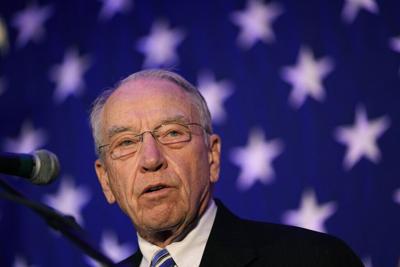KIMT-TV NEWS 3 – Iowa political leaders and ethanol industry executives are “extremely disappointed” in a federal decision on minimum biofuel blending levels.
Iowa Republican U.S. Senator Chuck Grassley criticized the Environmental Protection Agency’s (EPA) final rule, says it makes only modest increases to blend levels for certain biodiesel products, while the overall biofuels volume remains unchanged and ethanol volumes were reduced from proposed rule levels. Grassley issued the following statement:
“For an administration obsessed with reducing carbon emissions, this rule makes absolutely no sense. The EPA’s proposed rule signaled an increase in biofuels products for the next three years, and the industry is more than capable of meeting those production levels. Today’s RFS (Renewable Fuel Standard) rule waters down the earlier proposal. It’s an insulting bait-and-switch for the American biofuels industry, and totally inconsistent with this administration’s climate agenda.”
“American biofuels producers are leading the way in cleaner, cheaper, homegrown fuel. Rather than partnering with the biofuels industry, the Biden administration is turning its back on an opportunity to reduce emissions, consumer costs and reliance on foreign oil.”
Iowa Governor Kim Reynolds released the following statement in response to the Environmental Protection Agency announcing the RFS volumes for 2023 through 2025:
“At a time when American energy and national security is threatened, it’s disappointing to see the Biden Administration continue its assault on home grown, American energy production. Biofuels can play a key role in fighting off this energy crisis and provide millions of Americans with cheaper, cleaner burning fuel.”
Iowa Congresswoman Ashley Hinson released the following statement:
"The Biden Administration continues to ignore the clear benefits of Iowa biofuels to our all-of-the-above energy strategy, delivering yet another gut punch to our hardworking farmers and producers with this rule. This final rule will derail significant progress made by the advanced biofuels industry, negatively impact farmers and rural communities, and diminish our already weakened energy security -- it's a gigantic and unnecessary leap backwards. I will continue advocating for the expanded use of renewable fuels and fight for our Iowa producers in Washington."
Iowa Corn Growers Association President Denny Friest says:
“Iowa corn farmers are extremely disappointed to hear that EPA is reducing the RFS volumes. This proposal fails on all fronts in promoting sustainable fuel options available to American consumers. The EPA needs to stop disgracing Iowa farmers and their renewable homegrown, more affordable, clean-burning fuels that are readily available today. It’s time the EPA is held to a higher standard and restore the intent and strength of the RFS.”
Iowa Secretary of Agriculture Mike Naig released the following statement:
“The EPA’s final RFS volumes fail to meaningfully expand access to homegrown, domestic sources of energy like ethanol and biodiesel. While the increased blend levels for biodiesel and renewable diesel in this final rule are a slight improvement, the targets are still below production and usage levels. Additionally, the Biden Administration chose to do so at the expense of ethanol, therefore pitting one biofuel against another. Biofuels reduce costs at the pump for consumers, are cleaner burning for our environment, support our rural communities and move our country closer to energy independence. It’s unfortunate that the Biden administration fails to fully support these significant and widespread benefits for both farmers and consumers.”
This comment came from Tom Haag, President of the National Corn Growers Association (NCGA):
“Today’s final RFS volumes came in below levels EPA proposed for conventional biofuels for 2024 and 2025, holding ethanol volumes steady at 15 billion gallons. A multi-year RFS volume rule offers stability and certainty for renewable fuels. However, when it comes to addressing pressing energy, environmental and economic challenges, EPA’s final rule falls short of the emission reductions and cost-saving benefits the higher proposed ethanol volumes would have provided."
Geoff Cooper, President and CEO of the Renewable Fuels Association (RFA) has this to say:
“The RFS was intended to drive continual growth in all categories of renewable fuels well beyond 2022; instead, today’s final rule flatlines conventional renewable fuels at 15 billion gallons and misses a valuable opportunity to accelerate the energy sector’s transition to low- and zero-carbon fuels. By removing half a billion gallons of lower-carbon, lower-cost fuel, today’s rule needlessly forfeits an opportunity to further enhance U.S. energy security and provide more affordable options at the pump for American drivers.”
This was the reaction of Emily Skor, CEO of Growth Energy:
“The RFS remains one of America’s most successful clean energy policies, but, yet again, its full potential as a climate solution remains untapped. EPA’s decision to lower its ambitions for conventional biofuels runs counter to the direction set by Congress and will needlessly slow progress toward this administration’s climate goals. We should be expanding market opportunities for higher blends like E15, not leaving carbon reductions on the table. While the final rule offers a modest improvement in advanced volumes, EPA inexplicably failed to extend that recognition to conventional biofuels. The bioethanol industry has more than adequate supply to meet the higher volumes that were originally proposed in December 2022. Choosing not to put that supply to good use in decarbonizing the transportation sector runs counter to this administration’s previously-stated commitments and undermines the goal of reaching net-zero by 2050.”
Kurt Kovarik, Vice President of federal affairs for Clean Fuels Alliance America, issued this statement:
“EPA is undercutting the certainty that our industry hoped for from a three-year RFS rule. U.S. clean fuel producers, oilseed processors, fuel distributors and marketers have all made significant investments to grow the industry rapidly over the next several years. The industry responded to signals from the Biden administration and Congress aiming to rapidly decarbonize U.S. fuel markets, particularly aviation, marine, and heavy-duty transport, and make clean fuels available to more consumers. The volumes EPA finalized today are not high enough to support those goals. Clean Fuels appreciates the bipartisan support of Representatives, Senators and Governors who asked EPA to ensure that final volumes supported achievable, aggressive growth of advanced biofuel volumes. It is a shame that EPA failed to fully consider the data provided by other federal agencies and industry experts demonstrating the upward trajectory of our industry.”
Here is a comment from Brooke Coleman, Executive Director of the Advanced Biofuels Business Council:
“It’s a step back from the proposal and too many advanced biofuel gallons were left on the table, but we’re seeing some progress on cellulosic biofuels. It also takes long-overdue steps toward putting an end to small refinery exemptions. There is no path to a decarbonized economy without taking advantage of America’s world-class biomanufacturing sector. Ultimately, however, achieving real-world growth under this rule will depend heavily on the administration making the right decisions on a range of issues, from Inflation Reduction Act (IRA) tax credit eligibility to market access for higher biofuel blends.”















